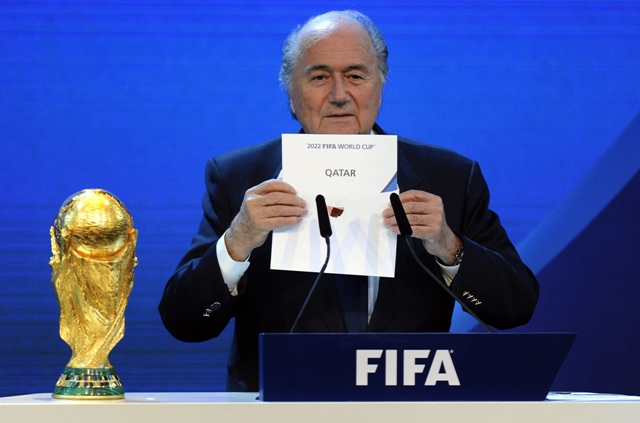GENEVA — Russia and Qatar were cleared Thursday by a FIFA judge of corruption in their winning bids for the 2018 and 2022 World Cups.
FIFA ethics judge Joachim Eckert formally ended a probe into the bidding contests, almost four years after the vote by the governing body's scandal-tainted executive committee. No proof was found of bribes or voting pacts.
"The evaluation of the 2018/2022 FIFA World Cups bidding process is closed for the FIFA Ethics Committee," the German judge wrote in a statement released by FIFA.
The 2022 World Cup will finally, it seems, be played in Qatar — though exactly when is still unclear as FIFA seeks an alternative to the desert heat in June and July.
"FIFA welcomes the fact that a degree of closure has been reached," the governing body said Thursday in a statement. "As such, FIFA looks forward to continuing the preparations for Russia 2018 and Qatar 2022, which are already well under way."
Despite finding wrongdoing among the 11 bidding nations, Eckert said the integrity of the votes was not affected.
"In particular, the effects of these occurrences on the bidding process as a whole were far from reaching any threshold that would require returning to the bidding process, let alone reopening it," he summarized.
The corruption case is still open for past and current members of FIFA's ruling board.
Critics of FIFA have long relied on Eckert and ethics prosecutor Michael Garcia to build a case to remove the wealthy desert emirate as host in 2022 by proving suspicions that votes and influence were bought. Qatar beat the United States 14-8 in the final round of a five-nation contest.
That hope ended as FIFA released Eckert's 42-page summary findings of the investigation reports, which have stayed secret against Garcia's wishes.
Whistleblower evidence from a former Qatar bid staffer who said there were illicit payments made to African voters was dismissed.
Payments by Mohamed bin Hammam to other African officials and FIFA vice president Jack Warner were judged to be for the disgraced Qatari's personal political interests, not the 2022 bid.
Still, both winners had issues highlighted by Eckert.
Qatar's bid had "potentially problematic facts and circumstances," plus a "significant lack of transparency" in its use of advisers. Computers leased for use by Russia staffers were later destroyed.
Garcia, a former U.S. Attorney in New York, was asked by Eckert to prosecute cases against individuals.
Exactly who that implicates is unclear as Eckert did not reveal who Garcia suspects of wrongdoing. Nor did Eckert identify by name any serving member of the FIFA board, except when praising FIFA President Sepp Blatter, nor officials linked to the nine bid candidates.
Eckert has previously said his final judgments could take until April. Appeals against sanctions, to FIFA and the Court of Arbitration for Sport, could extend the process even further.
England's failed 2018 campaign, which received only two of 22 votes in an all-European race, fared badly in Eckert's report. Netherlands-Belgium had no issues and Eckert did not include comments on the Spain-Portugal candidacy, which appeared to be the bid noted as the least cooperative with Garcia.
In the 2022 race, Australia was criticized for its consultants' behavior, while the United States, Japan and South Korea received only minor comments.
Garcia and his team gave Eckert 430 pages of reports after interviewing more than 75 witnesses, and amassing 200,000 pages of supporting documents.
Eckert acknowledged the probe lacked "coercive means" to seize potential evidence such as "money and paper trails," and had to rely on cooperation of witnesses.
Yet of 11 board members in 2010 who are no longer at FIFA, three declined to speak with Garcia and two could not be contacted.
Addressing public skepticism about how Qatar and Russia won, Eckert pointed to his duty as judge.
"The perception for example, according to which a FIFA World Cup vote must have been 'bought' if the host selected is not the one that has been generally considered a favorite ... is mere speculation and far from anything a judicial body like the FIFA Ethics Committee is allowed to accept as proof," Eckert noted.
